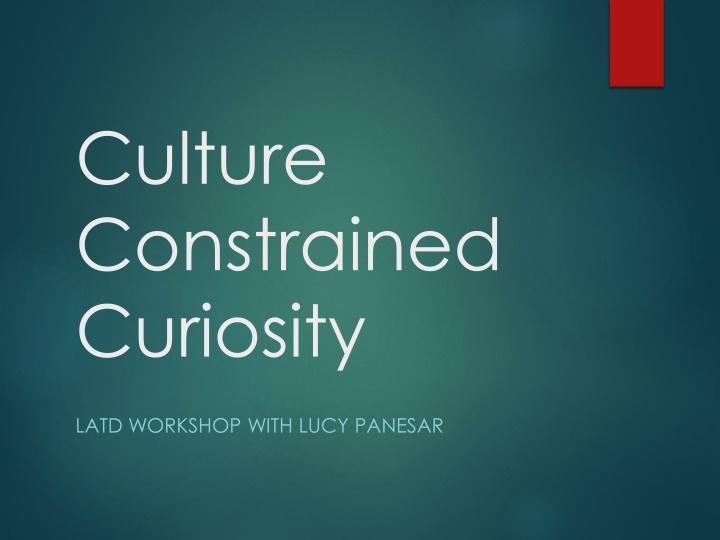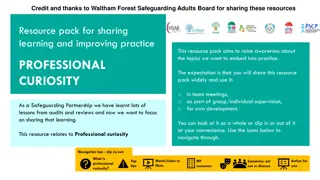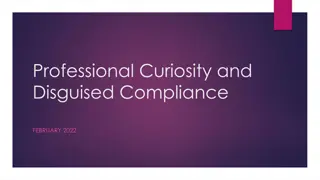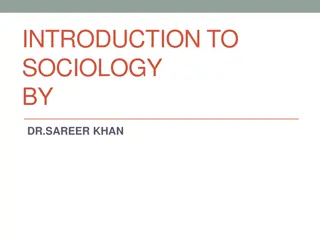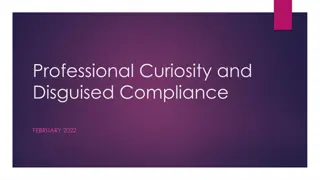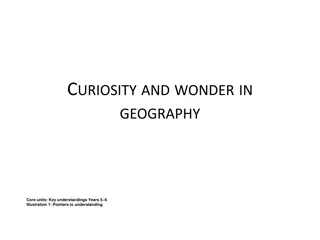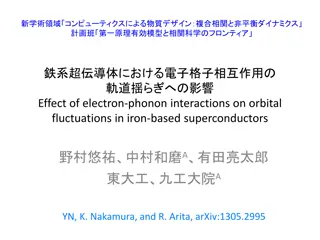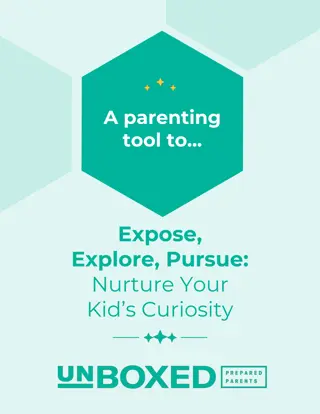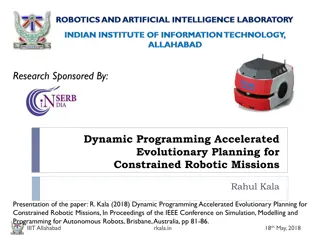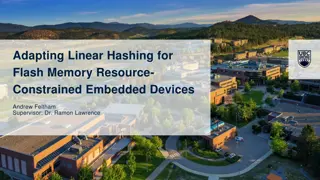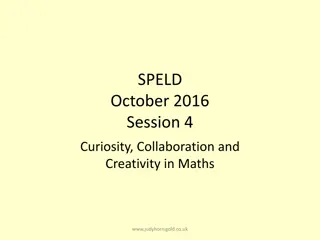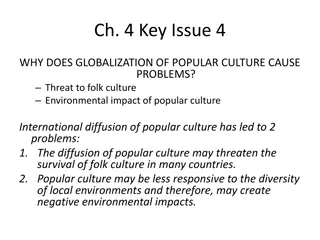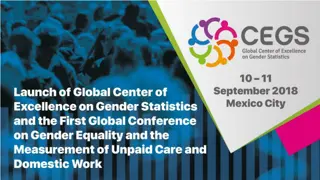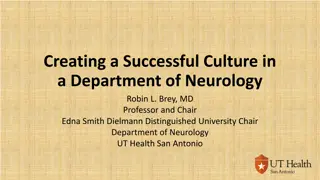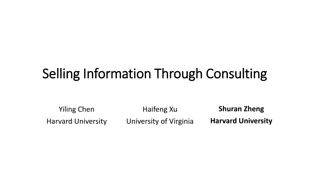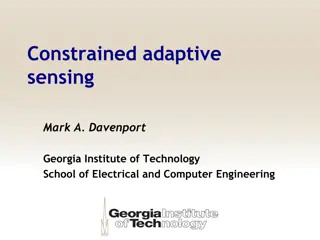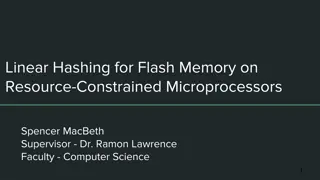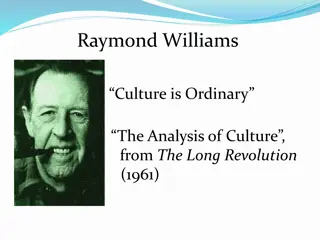Culture Constrained Curiosity Workshop
The Culture Constrained Curiosity workshop explores the impact of cultural identity on academic curiosity and ability. Delve into how cultural backgrounds can constrain students' curiosity, affecting their intellectual engagement and academic performance.
Download Presentation

Please find below an Image/Link to download the presentation.
The content on the website is provided AS IS for your information and personal use only. It may not be sold, licensed, or shared on other websites without obtaining consent from the author.If you encounter any issues during the download, it is possible that the publisher has removed the file from their server.
You are allowed to download the files provided on this website for personal or commercial use, subject to the condition that they are used lawfully. All files are the property of their respective owners.
The content on the website is provided AS IS for your information and personal use only. It may not be sold, licensed, or shared on other websites without obtaining consent from the author.
E N D
Presentation Transcript
Culture Constrained Curiosity LATD WORKSHOP WITH LUCY PANESAR
Culture Constrained Curiosity workshop WELCOME! Please take a handout on entry and sit at the relevant table (2, 3 or 4)
'Curiosity is one of the permanent and certain characteristics of a vigorous intellect' yet some students never really sign up to the intellectual project that is the course and 'learners can be differentially interpolated as more or less intellectually able based on their background and identity this process impacts on the capacity to perform' ; 'even checking a box to indicate your race or sex can trigger the stereotype in your mind and lower your test score.' Johnson, S. (1751) Quotes on Curiosity. Available at: http://www.samueljohnson.com/curiosit.html (Accessed: 25 January 2017) 1. Sabri, D. (2014) Becoming Students at UAL Signing up to the intellectual project that is course : Year 1 report of a 3-year longitudinal study for the University of the Arts London. Available at: https://myintranet.arts.ac.uk/staffandstudents/diversity/race-and-ethnicity/race- ethnicity-and-degree-attainment-programme/ (Accessed: 25 January 2017). p.8 2. Singh, G and Cowden, S (2016) 'Intellectuality, student attainment and the contemporary higher education system' in Steventon et al (ed.) Student Attainment in Higher Education: Issues, Controversies and Debates. Oxon: Routledge. p.88-89 3. Dweck, C. (2012) Mindset: Changing the way you think to fulfil your potential. London: Robinson. p.75 4.
'Curiosity is one of the permanent and certain characteristics of a vigorous intellect' yet 10 minutes to: 1. Discuss the quote your group has been given, which follows on from the above 2. Prepare a response to the question you have been given Johnson, S. (1751) Quotes on Curiosity. Available at: http://www.samueljohnson.com/curiosit.html (Accessed: 25 January 2017) 1.
Group 2 some students never really sign up to the intellectual project that is the course Q. If curiosity is linked to intelligence then how and why might the curiosity of some students be constrained by aspects of their cultural identity, and how does this affect their academic ability? 2. Sabri, D. (2014) Becoming Students at UAL Signing up to the intellectual project that is course : Year 1 report of a 3-year longitudinal study for the University of the Arts London. Available at: https://myintranet.arts.ac.uk/staffandstudents/diversity/race-and- ethnicity/race-ethnicity-and-degree-attainment-programme/ (Accessed: 25 January 2017). p.8
Group 2 some students never really sign up to the intellectual project that is the course Q. If curiosity is linked to intelligence then how and why might the curiosity of some students be constrained by aspects of their cultural identity, and how does this affect their academic ability? Points harvested: Problematic link between Intellect and Curiosity; comes back to how students are prepared for HE and how Art/Design is tied to intellectualism and the traditional canons of knowledge vs denigration of local/alternative knowledge
Group 3 ' learners can be differentially interpolated as more or less intellectually able based on their background and identity this process impacts on the capacity to perform' Q. Do we (consciously or unconsciously) perceive some student to be more or less curious and therefore able than others? 3. Singh, G and Cowden, S (2016) 'Intellectuality, student attainment and the contemporary higher education system' in Steventon et al (ed.) Student Attainment in Higher Education: Issues, Controversies and Debates. Oxon: Routledge. p.88-89
Group 3 ' learners can be differentially interpolated as more or less intellectually able based on their background and identity this process impacts on the capacity to perform' Q. Do we (consciously or unconsciously) perceive some student to be more or less curious and therefore able than others? Points harvested: Struggles again between intellect and curiosity; the notion of us having a good student in mind, stereotypes of good students; we are complicit in the way education system positions students in such ways (whether we agree or not); curiosity as a luxury (perhaps a Western one) reinforcing deficit models; raises big ethical questions.
Group 4 ' even checking a box to indicate your race or sex can trigger the stereotype in your mind and lower your test score.' Q. To what extent are our perceptions of students, and their perceptions of themselves as curious intellectuals, influenced by cultural stereotypes? 4. Dweck, C. (2012) Mindset: Changing the way you think to fulfil your potential. London: Robinson. p.75
Group 4 ' even checking a box to indicate your race or sex can trigger the stereotype in your mind and lower your test score.' Q. To what extent are our perceptions of students, and their perceptions of themselves as curious intellectuals, influenced by cultural stereotypes? Points harvested: The quote and question are both questionable i.e. notion of negative stereotyping; Highlights problems with data collection methods and how they can cause marginalization; the problems around the cultural identity of a student are real, but should/can be also explored positively/constructively.
Culture Constrained Curiosity workshop with Lucy Panesar LATD 2017 An extract from Duna Sabri s research This extract is from Becoming Students at UAL Signing up to the intellectual project that is course : Year 1 report of a 3-year longitudinal study for the University of the Arts London (Sabri, 2014, p.8).In the first two paragraphs Sabri highlights some cultural constraints experienced by students on their courses, and in the final paragraph highlights some initiatives which are acting as catalysts for liberating student s curiosity and engagement. Some students never really sign up to the intellectual project that is the course : in this pithy observation one tutor encapsulates two fundamental truths. The first is that all course curricula constitute a particular view of what it means to be a practitioner: graphic designer; artist; fashion designer; journalist; curator. They all impart some notion of an implied student (Ulriksen 2007). The second truth is that not all students comply with this intellectual and creative project: of these some accurately comprehend it, explicitly or tacitly, and choose not to participate in it, others do not make sense of it at all. Some tutors seemed to be taken aback at the suggestion that their curricula were historically and culturally situated; and may be somewhat Euro-centric. Others were highly conscious of the extent to which their views of graphic design , fashion or art were contestable and very much constructed by their own class, race, ethnicity and situated experiences or their own practice. Several talked about how often the examples they used with students were not only UK-specific but London-specific. There were also accounts of discussion and debate within course teams that seem to have taken place for some years. The work undertaken by Aisha Richards and Terry Finnigan as joint lead tutors on the module: Inclusive Learning and Teaching in Higher Education reveals a range of contexts in which tutors across UAL have engaged with issues of race and ethnicity within their curricula (e.g. discussing Whiteness among photography students) and started to change the delivery and the resources available within their course. In addition, these discussions link to UAL s support and inclusion of Shades of Noir http://www.shadesofnoir.org.uk/, a programme of events and resources that promotes change through raising the profile and level of debate on equality in art and design higher education. All reports can be downloaded from the Race and Ethnicity section of the UAL Staff Portal via this link: https://myintranet.arts.ac.uk/staffandstudents/diversity/race-and-ethnicity/race-ethnicity-and-degree- attainment-programme/
Recall a time when your curious intellect was constrained in some way by an aspect of your identity 10 minutes to: 1. Map the Process of Curiosity Constrained 2. Identify actual or possibly catalysts that got or could get the Cogs of Curiosity in Motion For example
Rote language learning with emphasis on grammar at comprehensive school The Process of Curiosity Constrained for me learning languages + local vernacular of working class Romford / no linguists to inspire or support me = A Great Big Grammar Barrier and put off languages!
New ability leading to new curiosity about grammar! What got my Cogs of Curiosity in Motion again Quickly able to say phrases with confidence Using Michel Thomas method who starts with recognisable words + simple joining words
1. Map the Process of your Curiosity Constrained 2. Identify what got/could get your Cogs of Curiosity in Motion
Harvest time! 10 minutes to share and collect: 1. What constraints and catalysts have you identified through the exercise? 2. How does this relate to your role at UAL? 3. What will you take away from this workshop today? One person per group to scribe and submit responses
Points harvested from the group Curiosity Constraints: Curiosity Cogs/Catalysts: Boredom, Irrelevance, Disconnect, Not Encouraged, Lacking Confidence + Knowledge, Praise (Lack of/Too much), Fear, Feeling Unsafe Time, Money, Freedom, Acceptance How we at UAL seize or grasp the word curiosity, Generational Issue of Distraction / Social Media Inspirational People (Mr Butler!) Facilitation, Interpretation, Seeing the Bigger Picture, Making Mistakes is OK, Making the link between Theory and Practice Prescriptive Education, Teaching by Rote, Class (Graduated), Lack of Critical Frameworks, Missing link between Theory and Practice
Culture Constrained Curiosity workshop THANK YOU! Enjoy the rest of the day
